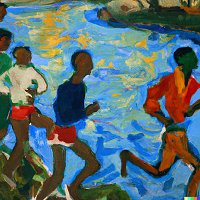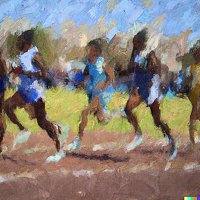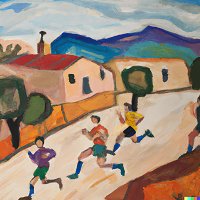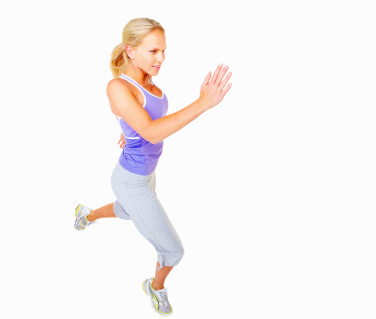Running Cramps During the Marathon
by Ray

When I run marathons I have this one problem.
I always cramp up badly by about mile 20.
How can I figure out what to do?
Don't know how to fix this.
Thanks in advance.
Answer by Dominique:
Hi Ray,
The marathon is an unforgiving distance. Running cramps, especially calf cramps are quite common for marathon runners. Even in the marathons that have gone well for me, I have had moments in which I felt like calf cramps were only just around the corner.
You know that feeling when your foot lands and this flutter / electric spark travels up your calf? Let's call it 25% cramps. They are not quite there yet, but you know they might hit the next step!
Without knowing much more about you, these are my best guesses about what needs to happen to reduce this problem:
1. Upgrade your training
2. Upgrade your fluid and fuel intake during the race
3. Upgrade your carb loading
Upgrade Your Training

More longer long runs
Try to incorporate more 20-mile runs into your training. I don't know your current marathon training build-up. A mistake I often see is that runners start their marathon running training from a low base. They may be doing 6-10 mile long runs. Then start a marathon training program.
It's not a bad start. But it does mean that they spend a lot of time building up their long run to 15-16 miles and then to 20-mile long runs. This type of build-up usually means that runners only hit 18-20 mile long runs 3 to 5 times in their training.
A much better position to be in is when you are already used to doing 13-15 mile long runs, then start your marathon training. Suddenly, the build up to 20 miles is much shorter. You get to run many 16-20 mile runs and more 20 mile long runs in your marathon training. You might be running 18 to 20 mile long runs a dozen times in your marathon training. And that makes a massive difference.
Also see the Marathon Training Tips page for further marathon training advice.
Upgrade Your Fluid and Fuel Intake During the Race

Proper fuel and fluid intake during a marathon does not mean a gel or two when you are starting to feel a bit tired and grabbing water at the next aid station when you are starting to feel thirsty.
It means a conscious and deliberate intake of 50-60g of carbs per hour through gels and/or chews or other means. And it means drinking regularly, basically at every drink station.
When you are a heavy sweater and/or you run your marathon on a hotter day, this becomes even more important. You lose a lot of electrolytes through sweating, which need to be replenished.
To be able to take in all this fuel and fluid during your marathon, you will want to practice with it in training. You will want to know which tastes of gels you really like and which you don't.
Upgrade Your Carb Loading

This will ensure your body is filled to the brim with glycogen and you give your muscles the best chance to endure the challenges of the marathon without shutting down in the final miles.
A marathon is as much a mental challenge as a physical one, especially in the final miles. When you reach the 20-22 mile mark, your body is under significant stress and naturally begins to protest. Even elite runners face this struggle. Paul Tergat, a former marathon world record holder, described the final miles of a marathon as entering "no man's land"—a place where your mental toughness becomes crucial. Remember, you're not alone in feeling this way, and everybody experiences this in the last miles of a marathon.
I hope these tips give you a good starting point to tackle those marathon cramps. With some adjustments to your training, fuel and fluid intake you'll increase your chances of finishing strong. Remember, every marathon is a learning experience, so take each race as an opportunity to refine your approach. Good luck, Ray, and happy running!
Kind regards,
Dominique


